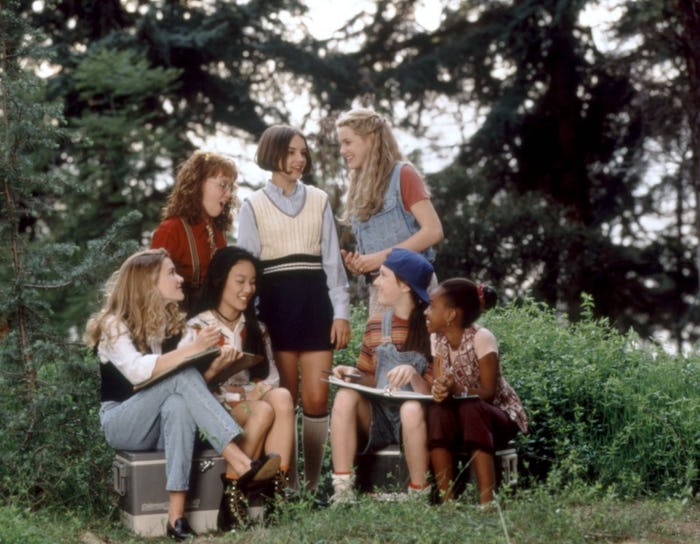Entertainment

I spent most summers during my childhood reading the classics, like The Baby-Sitters Club. What could be more entertaining than a never-ending series that followed a group of diverse girls as they traversed the dramatic landscape of childhood and entrepreneurship? Yeah, I was a Baby-Sitters Club diehard. I even followed Dawn into her spinoff series, California Diaries. And why? Because the girls were often navigating the same situations I was. And looking back, I’ve realized that there were plenty of awesome feminist moments in The Baby-Sitters Club that I’m only able to notice as a grown-ass woman.
As I grew up, and as I continued reading the books, I realized the series was about so much more than watching children to make a few extra bucks. The series was about friendship, family, being a girl, and navigating the (sometimes) dangerous waters of growing up. The fact that the series was laden with subtle feminism was something I didn’t even realize as a child, but makes me love the series even more as an adult. If you’re looking for the feminist meanings behind The Baby-Sitters Club, but were forced to donate the beloved books, then you’re in look. Here are seven super feminist moments from The Baby-Sitters Club series that will make you even prouder to be a fan of this group of girls.
1
When It Featured A GirlBoss
I mean, the first book is called Kristy's Great Idea. Kristy Thomas was the original girlboss, in my mind. She came up with the idea of The Babysitter's Club, and ran a fairly successful operation (and bonus points for employing more girls.) A young girl coming up with a business idea on her own? And a book series revolving around that idea? Amazing.
2
When It Promoted Female Friendship
More important than the business, of course, was the friendships the series revolved around. Whether the girls were having problems with scheduling, boys, or time outs, The Babysitter's Club promoted the importance of female friendship above all. The girls stuck with each other through moves, bad grades, and bad decisions. And they were always there to lift each other up.
3
When It Celebrated Female Entrepreneurs
The members of The Babysitter's Club learned the ins and outs of being young female entrepreneurs. Whether it meant creating a budget, looking into insurance, or creating schedules, the girls rana successful business that inspired young women across the nation to create their own businesses. (Even if my leaf-art business never took off, I owe its inception to The Babysitter's Club.)
4
When All The Girls Had Time To Shine
Rather than focusing solely on Kristy and her great idea, the series evolved to include the viewpoints of all of the girls. Dawn, Mallory, Stacey, Mary Anne, Claudia, and Jessie they all had their own trials and tribulations, and the series focussed on these issues. It fostered a sense of being able to exist in a group of girls without competing for attention, or proverbial screen time. How feminist is that?
5
When It Celebrated Diversity
No babysitter was exactly like the other. The Baby-Sitters Club pushed the envelope when it came to breaking stereotypes of young women. Though there were several archetypes present (the tomboy, the artist, the hippie), each girl was multi-faceted and layered. Even though Kristy was the tomboy, she still had her chance at romance. Even though Stacey was the sophisticated girl, she still struggled with insecurities. The brilliant layers of diversity portrayed by The Baby-Sitters Club meant that the series was inclusive, which was nearly a first for a series of its kind.
6
When The Girls Spoke Their Minds
Often times, the girls's issues were a result of not standing up for themselves or not communicating their wants and needs properly. Whether Claudia was struggling while comparing herself to her sister Janine, or Kristy was feeling buried beneath the weight of her parents divorce, the girls always spoke their minds eventually, and always wound up better for it.
7
When It Was Made Into A Movie
Not only does the movie totally pass the Bechdel Test, the movie was written and directed by women. If that's not crushing feminism (crushing in the good way, obviously), I don't know what is! The movie starred some of the greatest female teen actresses of the nineties, including Rachael Leigh Cook and Larisa Oleynik. If you haven't seen the movie, I highly recommend it. Even as a grown ass lady, who can no longer dream of creating a babysitting club of her own.
Images: Columbia Pictures (7); Giphy